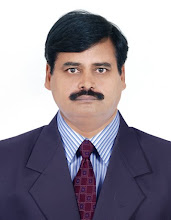Dear All
Continued the journey of publication and recently (October - December 2020) published the above paper in MAHILA PRATISHTHA, an International Multidisciplinary Journal and brief details include:
..................................................................
ABSTRACT
Poor availability, accessibility, and affordability
for agriculture inputs and food grains affect food security both at the stage
of production as well as distribution which finally lowers larger population’s health,
education, development, and other vulnerabilities with poor quality of life. Food is the basic and critical need of everyone
and India is the Agriculture based Country where around 70% of the rural population
depend on agriculture. The processes of Liberalization, Privatization and Globalization,
the model of development has got shifted to Business Oriented Development where
it aims for business or profit. Mismatch in inputs supports, crop management, transfer
of technologies, pattern of harvesting, transportation, storage, and other processes
have resulted for lower production with productivity with low returns. The farmers
and other people connected with agriculture are facing several challenges and
are unable to continue agriculture as it has become uneconomic. The mission of
food security gets affected both at production and its distribution. There
exist several leakages of food grains and wastage at all levels. Water is another
precious natural resource which is well connected with the production of food
grains and further with poverty and development. India has accepted Sustainable
Development Goals and further developed its future vision as Modern India with
several missions where Zero Hungry, Food Security and Sustainable Agriculture as
Goal 2 has gained priority. In addition to the efforts made by Government to achieve
the targets and indicators of Goal 2 as a partner, Civil Society Organizations do
have several opportunities at all the stages of Food Security. The initiatives
as opportunities are need based and simple and are expected to result for significant
impact with better sustainability and quality.
Key Words: Water, Food, Farmers, Hungry, Health, Education, Development, Production, Productivity, Marketing, Sustainability, Quality of Life.
Statement of the Problem
Poor availability, accessibility, and affordability for agriculture inputs and food grains affect food security both at the stage of production as well as distribution which finally lowers larger population’s health, education, development, and other vulnerabilities with poor quality of life.The author is well connected (as a farmer,
explorer, faculty, guide, trainer, mentor, counselor, documenter, facilitator, mobilizer,
researcher, etc.) with the domains of Water, Health, Education, Agriculture,
Nutrition, and other associated as part of Development covering different
terrains and parts of the Nation and some of the initiatives taken up include:
Ø
Awareness
cum Advocacy on needs of People and Communities in general and specifically connected
with Water Security, Food Security, and Sustainable Agriculture.
Ø
Use
of Geotools (Geological, Geophysical, Hydrological, Geochemical, Drilling, and
other supporting tools) supported for mapping, assessment, identification, monitoring,
evaluation, protection, and management of water resources (both surface water and
subsurface / groundwater).
Ø
Training
and Workshops (for various stakeholders) on the need of transforming technologies
from Lab to Land with better utility; community preparedness to face hazards &
disasters; and other associated aspects of community development.
Ø
Teaching
connected with Water, Health, Sanitation (WASH), Education, Land & Soil Management,
Resettlement & Rehabilitation, Pollution & Environment, Project Management,
and other aspects of Community Development.
Ø
Research
activity in the area of Water, Sanitation (WASH), Education, Food & Nutrition,
Resettlement & Rehabilitation, Social Marketing, and Product Making.
Ø
Supporting
Conferences and Seminars with presentations connected with Water, Nutrition, Education,
Land & Soil, Agriculture, and other aspects of Community Development.
Ø
Use
of E Forums for better connectivity, reach, sharing, dissemination, facilitation,
care, and other needed services and supports.
Ø
Publication
of papers (in National and International Journals, Seminar Volumes & Edited
books) on subjects like Water, Sanitation (WASH), Food & Nutrition, Farmers,
Community Development, Social Marketing, Land & Soil, Hazards & Disasters,
Resettlement & Rehabilitation, Pollution & Environmental Management,
and other aspects of Development of People & Communities.
Ø
Mentoring
CSOs working on Water, Health, Sanitation (WASH), Education, Agriculture, Food
& Nutrition, Product Making, Land & Soil, Pollution & Environment,
Consumer Protection, etc., with priority for rural areas.
Ø Mobilization of Resources for CSOs with better connectivity of Government, Private, Corporate, Fudging Agencies (both National and International), and other Agencies.
Recommendations
It is observed
that Sustainable Agriculture and Food Security has gained priority for the development
of People and Nation and the recommendations made include:
ü Better Awareness
with IEC Martials on Sustainable Development Goals to various Stakeholders.
ü Trainings, Workshops,
Conferences, and Seminars on Sustainable Development Goals with priority for
Farmers, and other concerned groups of Agriculture and Water Departments,
ü Support Schools,
Colleges, and Universities for better sharing and dissemination with the use of
technologies.
ü Support National
Institutes, and other Research Centers connected with Agriculture and Food Processing
& Product Making for effective transfer of technologies from Lab to Land
with better management.
ü Develop Farm Clubs
to support inputs, crop management, production, processing, product making,
marketing, and disposal with better quality and sustainability.
ü Linkup Farmers
& Community with Self Help Groups for Product Making and Marketing with
better returns.
ü Support Civil Society Organizations to work with Government and Private (including Corporate) on Partnership basis for better Food Security and Sustainable Agriculture.
.............................................
Looking forward
With tahnks
